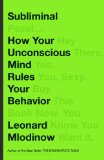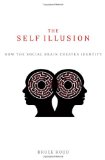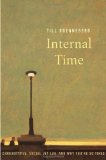April 30, 2012

The Good, the True, and the Beautiful: A Neuronal Approach (An Editions Odile Jacob Book) by Jean-Pierre Changeux, tr. Laurence Garey (Yale University Press, 2012)
(amazon.co.uk – 30 Jun)
Book description from the publisher:
In this fascinating and bold discussion, a renowned neurobiologist serves as guide to the most complex physical object in the living world: the human brain. Taking into account the newest brain research—morphological, physiological, chemical, genetic—and placing these findings in the context of psychology, philosophy, art, and literature, Changeux ventures into the unexplored territories where these diverse disciplines intersect.
Changeux’s book draws on Plato’s notion that the Good, the True, and the Beautiful are celestial essences or ideas, independent but so intertwined as to be inseparable. Placing these essences within the characteristic features of the human brain’s neuronal organization, the author addresses unsolved questions in neuroscience today. With imagination and deep insight, Changeux illuminates the evolution of the brain and deciphers what new developments in neuroscience may portend for the future of humanity.
Comments (0)
- cognitive science,new books
April 24, 2012

Subliminal: How Your Unconscious Mind Rules Your Behavior by Leonard Mlodinow (Pantheon, 2012)
(kindle ed.), (amazon.co.uk – 10 May)
Book description from the publisher:
Leonard Mlodinow, the best-selling author of The Drunkard’s Walk and coauthor of The Grand Design (with Stephen Hawking), gives us a startling and eye-opening examination of how the unconscious mind shapes our experience of the world and how, for instance, we often misperceive our relationships with family, friends, and business associates, misunderstand the reasons for our investment decisions, and misremember important events.
Your preference in politicians, the amount you tip your waiter—all judgments and perceptions reflect the workings of our mind on two levels: the conscious, of which we are aware, and the unconscious, which is hidden from us. The latter has long been the subject of speculation, but over the past two decades researchers have developed remarkable new tools for probing the hidden, or subliminal, workings of the mind. The result of this explosion of research is a new science of the unconscious and a sea change in our understanding of how the subliminal mind affects the way we live.
Employing his trademark wit and lucid, accessible explanations of the most obscure scientific subjects, Leonard Mlodinow takes us on a tour of this research, unraveling the complexities of the subliminal self and increasing our understanding of how the human mind works and how we interact with friends, strangers, spouses, and coworkers. In the process he changes our view of ourselves and the world around us.
Google books preview:
Comments (0)
- cognitive science,new books,psychology
April 23, 2012

Good Thinking: Seven Powerful Ideas That Influence the Way We Think by Denise D. Cummins (Cambridge University Press, 2012)
(amazon.co.uk)
Book description from the publisher:
Do you know what economists mean when they refer to you as a “rational agent”? Or why a psychologist might label your idea a “creative insight”? Or how a philosopher could be logical but also passionate in persuading you to obey “moral imperatives”? Or why scientists disagree about the outcomes of experiments comparing drug treatments and disease risk factors? After reading this book, you will be wiser in two ways: You will know how the best and brightest thinkers judge the ways we decide, argue, solve problems, and tell right from wrong. But you will also understand why, when we don’t meet these standards, it is not always a bad thing. The answers are rooted in the way the human brain has been wired over evolutionary time to make us kinder and more generous than economists think we ought to be, and more resistant to change and persuasion than scientists and scholars think we ought to be.
Table of contents:
1. Introduction
2. Rational choice: choosing what is most likely to give you what you want
3. Game theory: when you’re not the only one choosing
4. Moral decision-making: how we tell right from wrong
5. The game of logic
6. What causes what?
7. Hypothesis testing: truth and evidence
8. Problem solving: another way of getting what you want
9. Analogy: this is like that
Comments (0)
- cognitive science,new books,psychology
April 22, 2012

The Self Illusion: How the Social Brain Creates Identity by Bruce Hood (Oxford University Press, USA)
(amazon.co.uk – 19 Apr)
Book description from the publisher:
Most of us believe that we are an independent, coherent self–an individual inside our head who thinks, watches, wonders, dreams, and makes plans for the future. This sense of our self may seem incredibly real but a wealth of recent scientific evidence reveals that it is not what it seems–it is all an illusion.
In The Self Illusion, Bruce Hood reveals how the self emerges during childhood and how the architecture of the developing brain enables us to become social animals dependent on each other. Humans spend proportionally the greatest amount of time in childhood compared to any other animal. It’s not only to learn from others, Hood notes, but also to learn to become like others. We learn to become our self. Even as adults we are continually developing and elaborating this story, learning to become different selves in different situations–the work self, the home self, the parent self. Moreover, Hood shows that this already fluid process–the construction of self–has dramatically changed in recent years. Social networking activities–such as blogging, Facebook, LinkedIn, and Twitter–are fast becoming socialization on steroids. The speed and ease at which we can form alliances and relationships are outstripping the same selection processes that shaped our self prior to the internet era. Things will never be the same again in the online social world. Hood offers our first glimpse into this unchartered territory.
Who we are is, in short, a story of our self–a narrative that our brain creates. Like the science fiction movie, we are living in a matrix that is our mind. But Hood concludes that though the self is an illusion, it is an illusion we must continue to embrace to live happily in human society.
Google books preview:
See also: Author’s website, Royal Institution 2011 Christmas Lectures
Comments (0)
- cognitive science,consciousness,new books,psychology,self
April 20, 2012

Internal Time: Chronotypes, Social Jet Lag, and Why You’re So Tired by Till Roenneberg (Harvard University Press, 2012)
(amazon.co.uk)
Book description from the publisher:
Early birds and night owls are born, not made. Sleep patterns may be the most obvious manifestation of the highly individualized biological clocks we inherit, but these clocks also regulate bodily functions from digestion to hormone levels to cognition. Living at odds with our internal timepieces, Till Roenneberg shows, can make us chronically sleep deprived and more likely to smoke, gain weight, feel depressed, fall ill, and fail geometry. By understanding and respecting our internal time, we can live better.
Internal Time combines storytelling with accessible science tutorials to explain how our internal clocks work—for example, why morning classes are so unpopular and why “lazy” adolescents are wise to avoid them. We learn why the constant twilight of our largely indoor lives makes us dependent on alarm clocks and tired, and why social demands and work schedules lead to a social jet lag that compromises our daily functioning.
Many of the factors that make us early or late “chronotypes” are beyond our control, but that doesn’t make us powerless. Roenneberg recommends that the best way to sync our internal time with our external environment and feel better is to get more sunlight. Such simple steps as cycling to work and eating breakfast outside may be the tickets to a good night’s sleep, better overall health, and less grouchiness in the morning.
Comments (1)
- cognitive science,new books,psychology







